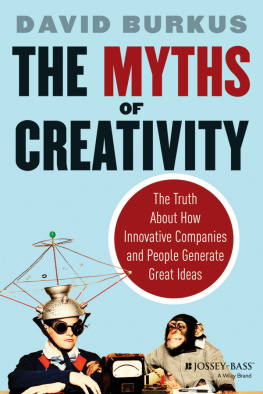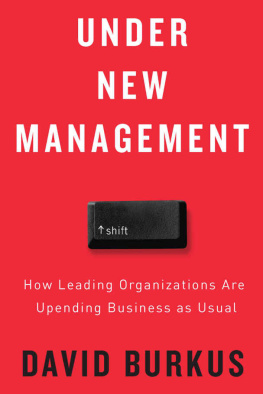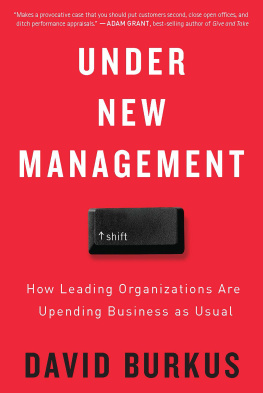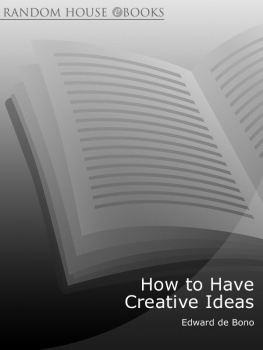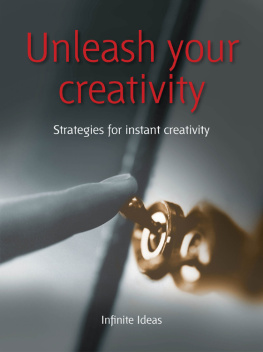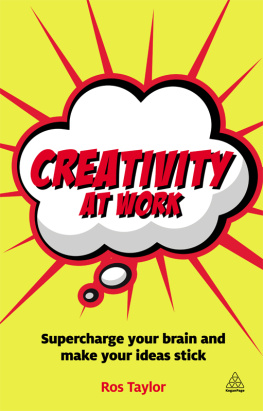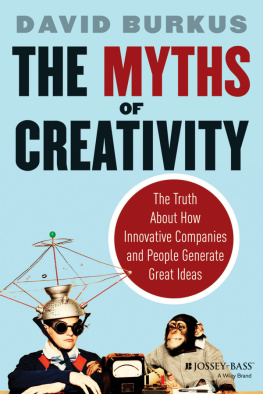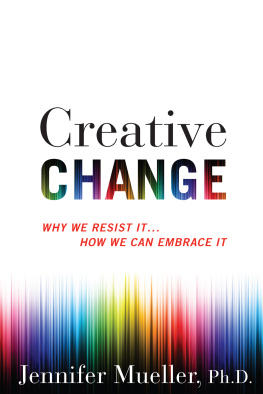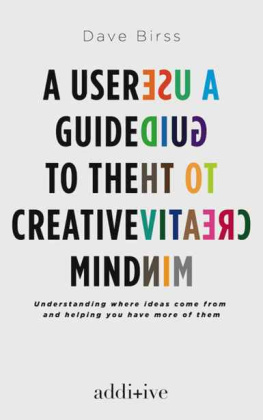
Table of Contents
Cover design by Adrian Morgan
Cover photograph by Andrew Rich | Getty
Copyright 2014 by David Burkus. All rights reserved.
Published by Jossey-Bass
A Wiley Brand
One Montgomery Street, Suite 1200, San Francisco, CA 94104-4594www.josseybass.com
No part of this publication may be reproduced, stored in a retrieval system, or transmitted in any form or by any means, electronic, mechanical, photocopying, recording, scanning, or otherwise, except as permitted under Section 107 or 108 of the 1976 United States Copyright Act, without either the prior written permission of the publisher, or authorization through payment of the appropriate per-copy fee to the Copyright Clearance Center, Inc., 222 Rosewood Drive, Danvers, MA 01923, 978-750-8400, fax 978-646-8600, or on the Web at www.copyright.com. Requests to the publisher for permission should be addressed to the Permissions Department, John Wiley & Sons, Inc., 111 River Street, Hoboken, NJ 07030, 201-748-6011, fax 201-748-6008, or online at www.wiley.com/go/permissions.
Limit of Liability/Disclaimer of Warranty: While the publisher and author have used their best efforts in preparing this book, they make no representations or warranties with respect to the accuracy or completeness of the contents of this book and specifically disclaim any implied warranties of merchantability or fitness for a particular purpose. No warranty may be created or extended by sales representatives or written sales materials. The advice and strategies contained herein may not be suitable for your situation. You should consult with a professional where appropriate. Neither the publisher nor author shall be liable for any loss of profit or any other commercial damages, including but not limited to special, incidental, consequential, or other damages. Readers should be aware that Internet Web sites offered as citations and/or sources for further information may have changed or disappeared between the time this was written and when it is read.
Jossey-Bass books and products are available through most bookstores. To contact Jossey-Bass directly call our Customer Care Department within the U.S. at 800-956-7739, outside the U.S. at 317-572-3986, or fax 317-572-4002.
Wiley publishes in a variety of print and electronic formats and by print-on-demand. Some material included with standard print versions of this book may not be included in e-books or in print-on-demand. If this book refers to media such as a CD or DVD that is not included in the version you purchased, you may download this material at http://booksupport.wiley.com. For more information about Wiley products, visit www.wiley.com.
Library of Congress Cataloging-in-Publication Data
Burkus, David, date.
The myths of creativity : the truth about how innovative companies and people generate great ideas / David Burkus. First edition.
pages cm
Includes bibliographical references and index.
ISBN 978-1-118-61114-2 (hardback); ISBN 978-1-118-72976-2 (ebk.); ISBN 978-1-118-72988-5 (ebk.)
1. Creative ability in business. 2. Creative thinking. 3. New products. 4. Technological innovations. I. Title.
HD53.B87 2014
658.3'14dc23
2013022237
To Janna
The Creative Mythology
There is a mythology that surrounds creativity.
Myths are storiesusually very old storiesthat are developed and passed down in an effort to explain why certain mysterious events occur or to affirm how we should behave and think. Cultures develop myths when they can't rely on existing knowledge to explain the world around them. The ancient Greeks told and retold stories of gods, supernatural creatures, and regular mortals as a way to explain how they thought the world worked. The myths they developed were an attempt to explain the mysteries they couldn't readily understand, such as the forces of nature, what happened after death, and even the mysterious process of creativity.
They created the muses, who received and answered the prayers of ancient writers, musicians, and even engineers. As the Greeks' mythology developed, the muses did as well. Their mythology ultimately included nine muses who acted like patron saints of creativity, each providing mortals with inspired insights in a specific area. Calliope was the muse of epic poetry; Clio, the muse of history; Erato, the muse of love poetry; and so on.
The Greeks believed that all creative insight flowed from these muses, so they worshipped them in search of a creative source and the experience of creating something extraordinary. The act of creating something inspired by the muses was a divine privilege. Some of the greatest minds in Greece at the time, including Plato and Socrates, built shrines for or worshipped at temples dedicated to their muse of choice (or hedged their bets and prayed to them all). The classic Greek epic poems The Iliad and The Odyssey both open with prayers to a muse.
The Greeks even developed legends to warn against crossing the muses. In one story, Thamyris, a skilled singer, became overly proud of his musical skills. He boasted that he could outsing the muses and challenged them to a contest. The muses indulged his insolence and accepted the challenge. He competed against the muses and lost. The muses did not look kindly on his challenge. They blinded Thamyris and stole his ability to write poetry and play the lyre, leaving him unable to create art ever again. The legend of Thamyris was told to reinforce the belief that gods and the muses were the source of all talent and creative ability. Just as they could bestow it, they could also take it away. The only means of sustaining a creative career, then, was to continue to worship the muses and thank the gods that created them as a means to send their gifts to mortals.
This belief that creativity is a divine gift isn't limited to the ancient Greeks. Theologians from a variety of religions throughout history, including Christianity, asserted that God was the sole source of creativity in the universe. Even into the Middle Ages in Europe, the prevailing belief was that creative ideas were divine and that their derivatives were human. God's blessing was the explanation for all creative talent and inspiration. When one was asked where the idea for a song, poem, or invention came from, the answer of that time was always the same: from God.
Over time, the Greek influence on the Western world ensured that the legend of the muses continued on. It can be seen in literature throughout Western history. In Canto II of Dante's Inferno, he cries out to the muses for aid. In Troilus and Criseyde, Geoffrey Chaucer woos Clio, asking her to serve as his muse. William Shakespeare's Henry V opens with an invocation to the muses in the same style as The Iliad and The Odyssey. During the Enlightenment, many of the leading thinkers of the eighteenth century sought to reestablish a cult of the muses as a means to further their own intellectual pursuits. Voltaire, Danton, and even Benjamin Franklin attended meetings at a Masonic lodge named Les Neufs Soeurs, the Nine Sisters. Our modern culture still feels the effects of their efforts in such words as museum, whose original meaning was cult place of the muses but has since come to refer to any place where public knowledge or creative works are displayed.
The remnants of this original mythology appear in many of the conversations I find myself in, such as one I keep having with an old friend of mine from college. We've taken a few writing courses together, and she's always wanted to write a novel. When she came up with the initial concept over ten years ago, she did all the research but never got started on a manuscript. When last we spoke, she was still no closer to writing her novel. She had nothing but a notebook full of research and a blank page. When I ask about her writing, she always gives the same response: I just couldn't find the inspiration to sit down and write. She may never outwardly say it, but her actions (or lack thereof) reveal a subtle belief that some outside force has to come to her to give her what she needs to write.
Next page
